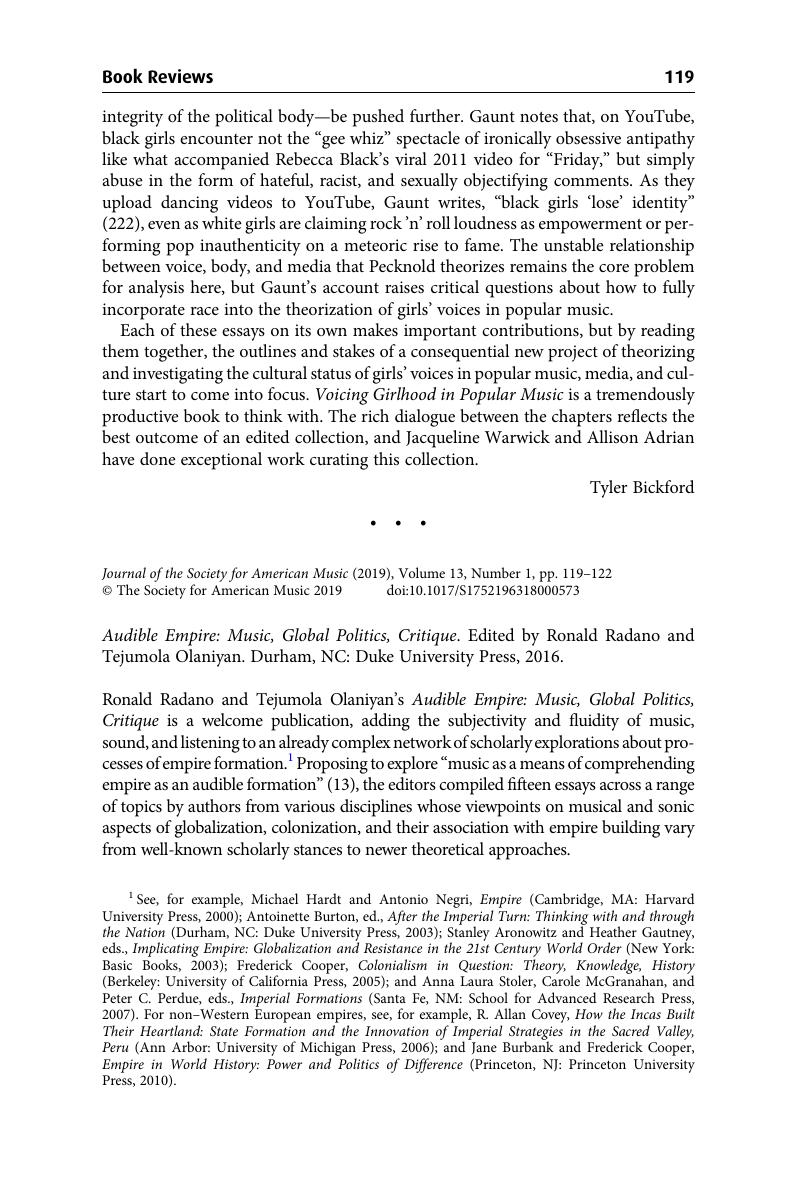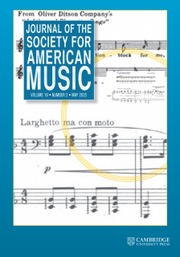No CrossRef data available.
Article contents
Audible Empire: Music, Global Politics, Critique. Edited by Ronald Radano and Tejumola Olaniyan. Durham, NC: Duke University Press, 2016.
Published online by Cambridge University Press: 18 February 2019
Abstract

- Type
- Book Review
- Information
- Copyright
- Copyright © The Society for American Music 2019
References
1 See, for example, Hardt, Michael and Negri, Antonio, Empire (Cambridge, MA: Harvard University Press, 2000)Google Scholar; Burton, Antoinette, ed., After the Imperial Turn: Thinking with and through the Nation (Durham, NC: Duke University Press, 2003)CrossRefGoogle Scholar; Aronowitz, Stanley and Gautney, Heather, eds., Implicating Empire: Globalization and Resistance in the 21st Century World Order (New York: Basic Books, 2003)Google Scholar; Cooper, Frederick, Colonialism in Question: Theory, Knowledge, History (Berkeley: University of California Press, 2005)Google Scholar; and Stoler, Anna Laura, McGranahan, Carole, and Perdue, Peter C., eds., Imperial Formations (Santa Fe, NM: School for Advanced Research Press, 2007)Google Scholar. For non–Western European empires, see, for example, Covey, R. Allan, How the Incas Built Their Heartland: State Formation and the Innovation of Imperial Strategies in the Sacred Valley, Peru (Ann Arbor: University of Michigan Press, 2006)CrossRefGoogle Scholar; and Burbank, Jane and Cooper, Frederick, Empire in World History: Power and Politics of Difference (Princeton, NJ: Princeton University Press, 2010)Google Scholar.
2 For a dense discussion on the topic, see Cook, Nicholas, “Theorizing Musical Meaning,” Music Theory Spectrum 23, no. 2 (Fall 2001): 170–95CrossRefGoogle Scholar. For a topical study on popular music see Waterman, Christopher, “Big Man, Black President, Masked One: Models of the Celebrity Self in Yoruba Popular Music in Nigeria” in Playing with Identities in Contemporary Music in Africa, ed. Palberg, Mai and Kirkegaard, Annemette (Uppsala, Sweden: Nordiska Afrikainstituet, 2002), 19–22Google Scholar.
3 Burton, Antoinette, “Introduction,” in After the Imperial Turn Thinking with and through the Nation (Durham, NC: Duke University Press, 2003), 1CrossRefGoogle Scholar. In addition, the idea of a historically fixed post-Enlightenment West assumes that conquest and colonialism on one end, and notions of human rights and citizenship on the other, are solely failings and privileges of Europeans; see, for example, Cooper, Colonialism in Question, 16. For a critique of the “neat fit between territory, language, and identity” postulated by the modernist project of the nineteenth and twentieth centuries, see Suarez-Orozco, Marcelo and Qin-Hillard, Desiree, “Introduction,” in Globalization: Culture and Education in the New Millennium, ed. Suarez-Orozco, Marcelo and Qin-Hillard, Desiree (Berkeley: University of California Press, 2004), 3–4Google Scholar.
4 Wider, Gary, “Unthinking French History: Colonial Studies Beyond National Identity,” in After the Imperial Turn: Thinking with and through the Nation, ed. Burton, Antoinette (Durham, NC: Duke University Press, 2003), 105–6Google Scholar.
5 Jenkins, Henry, “Pop Cosmopolitanism: Mapping Cultural Flows in an Age of Media Convergence,” in Globalization: Culture and Education in the New Millennium, ed. Suarez-Orozco, Marcelo and Qin-Hillard, Desiree (Berkeley: University of California Press, 2004), 114–20Google Scholar.


